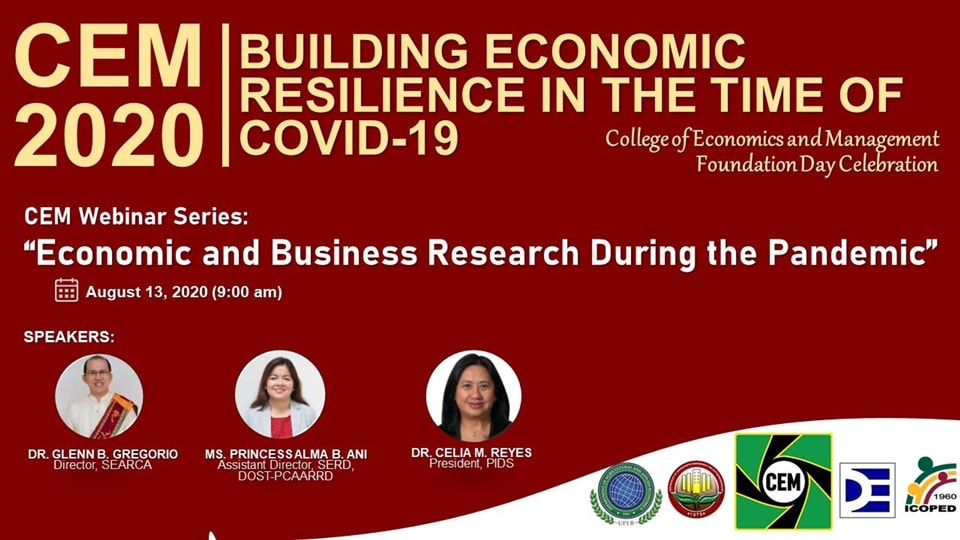
As COVID-19 poses a great challenge to the Philippine economy and in the Southeast Asian region, the essence of reshaping agricultural research and development was shared by Dr. Glenn B. Gregorio, Director of the Southeast Asian Regional Center for Graduate Study and Research in Agriculture (SEARCA), at the CEM Webinar Series held on 13 August 2020 via Zoom.
The webinar series was part of the founding anniversary celebration of the University of the Philippines Los Baños (UPLB)-College of Economics and Management (UPLB-CEM) with the theme "CEM 2020: Building Economic Resilience in the Time of COVID-19." As part of the celebration, the college hosted a series of webinars that tackled economics and business issues during the pandemic. Moreover, the webinars also discussed relevant topics such as agribusiness, cooperatives, research, and agricultural and economic development.
"This is our small way of engaging economists, industry practitioners, researchers, and the agriculture sector in discussing the implications of COVID-19 to the conduct of economic and business research," said Ms. Arlene C. Gutierrez, UPLB-CEM Associate Dean.
During the webinar, Dr. Gregorio highlighted the value chain showing the linkage between the supply and demand in an agricultural food system. He said "due to lockdown, mobility restrictions result to quantity reduction in farm labor, which if continued longer would translate to overall reduction in agriculture productivity. Agricultural production reduction is also caused by farmers' limited access to farm inputs and access to markets to sell produce, which may result to profit losses and wastage of farm produce."
"The loss of income and economic slowdown would also result to decrease in demand, particularly among the farmers and farming families with no safety nets," he added.
The SEARCA Director also shared that "if there's one key lesson from our experience with COVID-19 pandemic, it is in terms of how important food system is, and how fragile and vulnerable it could be, particularly during times of pandemic."
He also discussed the different programs and initiatives across the supply chain in response to COVID-19. Among the programs presented were the Agricultural Services Programme for Innovation, Resilience and Extension (ASPIRE), Stockpiling, Enhanced Production and Source Diversification, Bulk Buying of Produce from the Farmers, Price Freeze under a State of Calamity throughout the Philippines due to the Coronavirus Disease 2019, and Social Distancing and Other Precautionary Measures.
Dr. Gregorio also mentioned that "all these initiatives have a wide coverage, spanning the mobility restriction impacts on farmers, processors and distributors due to the lockdowns and community quarantines. Some retailers may have experienced increase in food prices due to unpredictable market, thanks to price freeze during state of calamity declaration. On the other hand, the COVID-19 have resulted to change in consumer preference."
On top of the rigorous discussion on the demand and supply value chain value, Dr. Gregorio presented SEARCA's new paradigm towards accelerating transformation through agricultural innovation (ATTAIN) in line with its 11th Five-Year Plan (2020-2025).
"I am here today to tell you a story of hope and something that is concrete and is surely achievable. Our experience with COVID-19 has surely enabled us to rethink how we approach and view agriculture, how we view food production, and how we view food. There is a need for an accelerated transformation of the agriculture sector so it can be fully maximized for human well-being," he affirmed.
The Academe-Industry-Government (AIG) Interconnectivity Model was also mentioned in the webinar as a vital tool in reimagining environmental education. "HEI are key players in society's overall ability to achieve the aspired food security and economic development. But they can aspire to contribute beyond an economic development that is sustainable, inclusive, environment-friendly, and most importantly, resilient to current and future pandemics and other unanticipated disruptions," Dr. Gregorio said.
He ended his presentation by emphasizing the Center's mission and vision as a leading enabler and champion of excellence in ARD. "In the next five years, SEARCA's mission is to elevate the quality of life of agricultural families through sustainable livelihoods and access to modern networks and innovative markets. Ensuring a systemic transformation of the agricultural systems into resilient, sustainable, productive, and inclusive food systems would be crucial for the future of Southeast Asia."
Other invited speakers in the webinar were Dr. Celia M. Reyes, President of the Philippine Institute for Development Studies (PIDS), and Ms. Princess Alma B. Ani, Assistant Director, Socio-Economics Research Division, Department of Science and Technology-Philippine Council for Agriculture, Aquatic and Natural Resources Research and Development (DOST-PCAARRD).